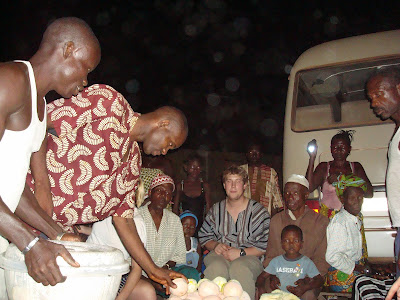
I have been avoiding recounting my thoughts on my trip to Sierra Leone for too long. Tonight was the first time after a month of being back that I met with my fellow students who went on this trip and discussed how we had been managing emotions, talking with others and thinking about our experiences since we had gotten back. Tonight I realized that I need to do more to explain to myself and others what this experience meant, so I will blog about it here once a week, even if it is just little tid bits, stories, ideas...
I need to get something out.
I am not sure where to begin because I can talk for hours on what I did, saw and heard while I was in Africa and still not seem to come to any concrete conclusions, revelations or even organize my thoughts in an organized way that allows me to analyze what is happening on the ground or internationally.
So this is going to be very disorganized and random and possibly sometimes incoherent. So here goes...
A vivid memory that sticks out for me was our night at the village in the middle of the jungle. Getting there was a feat! Our 14 seater bus traveled on dirt pathways that had been carved out of dense jungle and meant for small motorbikes. We plummeted down into a pond that intersected the pathway and where a number of people were bathing.
Many of my colleagues thought that the village was one of the most humbling and heart warming experiences of their time there. When we arrived the villagers came running out of their huts with their babies in their arms and started cheering and singing for us. We were the first 'visitors' they had ever had and the first whites that many of them had ever seen. People from the villages a few miles away had even made the journey to spend the night with us.
We were quickly shown around the village that comprised of about 10 mud huts, and I saw the creek where they get their drinking water and the two mass graves where a number of the villagers had been buried after the rebels had invaded. This trip was organized by a woman who works closely with this village through her NGO to help them learn ways to practice hygiene, build wells, and improve their small village. She told me with a sigh of dismay and frustration that the villagers still will drink straight from the creek, even though that she has taught them that the water must be boiled before it is drank.
Right from the start I felt uncomfortable though because one of the elder men in the village had asked me if I would give him the Panama hat that I had been wearing. I smiled at him and said "No! This is mine!" in a sort of 'jovial' and giggley way, but I felt terrible about saying this and doing this. For the rest of the night I kept going back and forth in my mind, debating whether I should just part with this straw hat and what exactly that would mean to him and to me. Later a number of the girls in the village were hanging around me and asking me to give them my necklace, my shirt, my hat... I had so many things that they wanted, yet giving away one of my "few" possessions that I had brought on this trip seemed a hard thing for me to do. This attitude of the importance of 'my things' and 'my possessions' has been bothering me ever since.
The villagers prepared a feast for us and gave us anything that we asked for. They even tried to give us their children to bring back with us to the United States! How was it that I was having trouble parting with a stupid hat that I had bought in the South of France?!
I rationalize this selfishness on my part as thinking that giving one of the villagers my things would not have solved anyone's problems, but would have just made someone incredibly happy, and a lot of the others incredibly jealous. It would have also re enforced this precedent that white people are here to give and Africans are to receive. This is not the line of work that I want to go into and my goals for the future are to empower not to give charity.
So even though I can justify morally why I did not give away my straw hat, I still feel something tugging on my heart. I am wondering what those villagers are up to this moment and what they think of our visit. Are they truly as happy as they were when they greeted us, now that they have met us and seen that we did not solve any of their problems of poverty, hunger, lack of education and disease? Will any of the young children remember our visit as they grow up and say to themselves, I want to pursue my education so that I can gain a better understanding of why these white people came to visit my village?
Was our visit meaningful to the Sierra Leoneons?


No comments:
Post a Comment